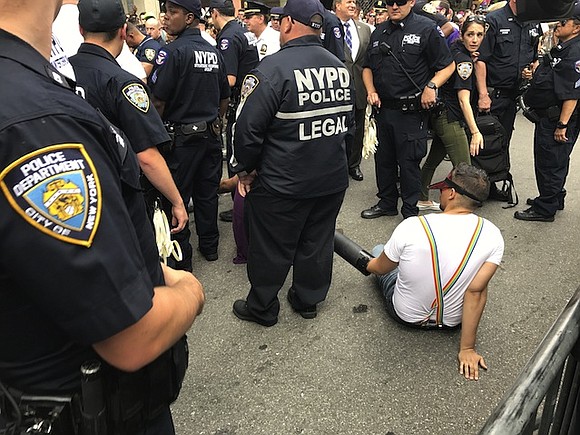At Pride Celebrations, Protesters Chant 'No Justice, No Pride'
CNN/Stylemagazine.com Newswire | 6/26/2017, 7:23 a.m.

By Emanuella Grinberg
CNN
(CNN) -- At Pride celebrations across the United States on Sunday, a protest movement that aims to draw attention to the struggles of marginalized people within the LGBTQ community made itself heard.
Activists carrying signs declaring "No Justice No Pride" and "Black Lives Matter" appeared in New York, Minneapolis and Seattle, among other major cities. In some they were welcomed and invited to speak; in others, the activists interrupted parades and clashed with police, leading to an unconfirmed number of arrests.
The protests disrupted pride events earlier this month in Columbus, Ohio and Washington, DC. Their causes varied -- police shootings, violence against transgender women of color, mass deportations, corporate sponsorship of Pride -- but organizer Angela Peoples said members of the grassroots movement were united by concerns of the "whitewashing" of the LGBTQ community.
"There's a broad concern among LGBTQ folks, especially people of color, that this movement that claims victory around marriage equality has very much left behind those of us who still experience marginalization," Peoples said.
Law enforcement's participation in Pride parades embodies the disconnect, she said, pointing to the arrests of protesters last weekend in Columbus. So does the involvement of corporate sponsors that benefit from mass incarceration and the construction of the Dakota Access Pipeline, she said.
"This is a true grassroots movement where people are aligning under the notion that there's no equality and pride for some of us without reparations for all of us," she said.
In Minneapolis, protesters waving "Black Lives Matter signs" marched behind a large banner that read "Justice for Philando" in honor of Philando Castile, who was shot to death in a traffic stop. A jury acquitted the officer who killed him earlier this month.
Protesters blocked the parade route and delayed its start by more than an hour as they called for police to be excluded from Pride events.
Activists in Seattle halted the parade by blocking the road in honor of Charleena Lyle, a 30-year-old woman whom police said they shot and killed because she refused commands to drop a knife.
In New York, police said 12 people were arrested and charged with disorderly conduct. They were detained outside the historic Stonewall Inn as they carried signs that read "No Cops, No Banks."
NYC Pride organizers said they have a policy against restricting groups from participating. They said they decided to "authorize" the arrests so the march could proceed after the activists had demonstrated for 10 minutes.
"There were some 40,000 marchers behind them who needed to have their message (heard) as well," NYC Pride spokesperson James Fallarino said. "We believe strongly that it's a free speech event. That has worked on both ends of the spectrum. We have always held the line that any group interested in our march can participate."
Fallarino said it was impossible to run an event of Pride's size without police presence. Parade organizers recognize that police violence is a "major issue" in the United States, he said. They're trying to address it through a "good working relationship" with the NYPD.
"As you probably know, this march started after a police raid at Stonewall Inn. We've come a long way since then."
Indeed, Pride originated 48 years ago in the wake of the 1969 Stonewall riots, a series of uprisings by women of color from the LGBTQ community over the Inn's raid.
The significance of Pride's origins makes it the ideal staging ground for today's protests within the LGBTQ community, Peoples said. But they will continue after Pride ends.
"If you truly honor the history of Pride as well as the crisis we're in, then you will recognize the need for disruption to bring attention to issues of marginalized people," she said. "This is not a one-off movement."
Laura Ly and Dakin Andone contributed to this report.



